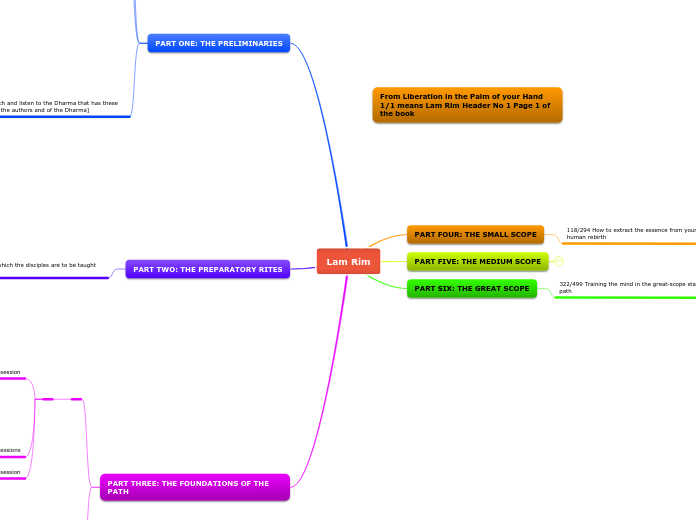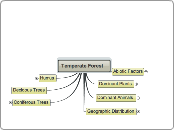From Liberation in the Palm of your Hand
1/1 means Lam Rim Header No 1 Page 1 of the book
Lam Rim
PART THREE: THE FOUNDATIONS OF THE PATH
102/270 The proper graduated training you should undertake after you have begun to rely on your spiritual guide
103/270 The stimulus to take the essence from your optimum human rebirth
114/278 Thinking about how difficult the optimum human rebirth is to acquire
117/283 Its difficult by nature to acquire
116/281 Some analogies for the difficulty of acquiring it
115/278 Thinking about the causes for its being so hard to acquire
110/275 Thinking about the great benefits of the optimum human rebirth
113/278 Thinking briefly about how even every moment of it can be most beneficial
112/276 Its great benefits from the ultimate point of view
111/276 Its great benefits from the short-term point of view
104/270 A short discussion to convince you
107/273 The endowments
109/274 The five endowments in relation to others
108/273 The five personal endowments
106/271 The freedoms
105/271 Identifying the optimum human rebirth
PART SIX: THE GREAT SCOPE
322/499 Training the mind in the great-scope stages of the path
364/574After developing bodhichitta, the way to train in the deeds of the children of the victorious ones
430/650 How to train in the four ways of gathering disciples in order to ripen the mindstreams of others
365/574 How to train in the six perfections in order to ripen your own mindstream
429/649 How to train in the uncommon part of the path, the Vajrayana
386/593 In particular, the way to train in the last two perfections
414/620How to train in the very essence of wisdom special insight
428/647Then, the way you develop special insight
422/642 Ascertaining the nonexistence of a self of phenomena
427/646 Ascertaining that unconditioned phenomena do not naturally exist
423/642Ascertaining that conditioned phenomena do not naturally exist
426/646 Ascertaining that nonassociated compositional factors do not exist by nature
425/644Ascertaining that consciousness does not naturally exist
424/642Ascertaining that physical things do not naturally exist
415/620 Ascertaining the nonexistence of a personal self
421/638When not in absorption, how to pursue the attitude that things are like an illusion
416/620 How to develop the absorption resembling space
420/636 The fourth key point: determining that they are not truly different
419/633 The third key point: determining that they are not truly the same
418/632The second key point: determining the full set of possibilities
417/626 The first key point: what is to be refuted
387/593 How to train in the very essence of concentrationmental quiescence
413/617 The way true mental quiescence develops from this point
412/617 How there are four types of mental process
411/616 The way to achieve the mental states through the six powers
401/612Taking this as the basis, how to achieve the nine mental states
410/615 Fixed absorption
409/615Becoming single-pointed
408/614 Becoming very pacified
407/614 Becoming peaceful
406/613 Becoming disciplined
405/613 Good fixation
404/613 Patchy fixation
403/612 Fixation with some continuity
402/612 Fixing the mind
395/599 The actual way to achieve mental quiescence
400/610 The fifth pitfall: [readjustment]
399/606 The fourth pitfall: nonadjustment
398/604 The third pitfall: excitement and dullness
397/601 The second pitfall: forgetting the instruction
396/600 The first pitfall: laziness
388/595 Cultivating the prerequisites for mental quiescence
394/598 Completely abandoning conceptual thoughts such as desire
393/597 Abandoning the demands of society
392/597 Having pure ethics
391/597 Being content
390/597 Having few wants
389/595 Dwelling in a conducive place
366/574 The general way to train in the deeds of the children of the victors
379/587 Perseverance
385/591 The perseverance of working for the sake of sentient beings
384/145The perseverance to collect virtuous things
383/590 Armor-like perseverance
382/588 The laziness of defeatism
381/588 The laziness of craving evil pursuits
380/588 The laziness of sloth
375/581How to train in patience
378/586 The patience to gain assurance in the Dharma
377/585 The patience of accepting suffering
376/581 The patience of remaining calm in the face of your attackers
371/579 The practice of the perfection of ethics
374/580 The ethic of working for the sake of sentient beings
373/580 The ethic of gathering virtuous Dharma
372/579 The ethic of refraining from misdeeds
367/575 Generosity
370/576 The generosity of giving others fearlessness
369/575 Being generous with the Dharma
368/575Being generous with material things
324/516 The way to develop bodhichitta
363/574 The activities to train in after developing bodhichitta
362/573&651 Developing bodhichitta through the ritual of taking vows
432/658How to keep your vows from degenerating once you have acquired them
450/660 The advice related to the involvement form of bodhichitta
433/658 Advice related to the aspiration form of bodhichitta
434/658 Advice on creating the causes never to be separated from bodhichitta in your remaining rebirths
445.422.322.212.2.659 Four actions [producing] white [karmic results] to be cultivated
449/660 Causing the sentient beings who are maturing under your care to uphold bodhichitta
448/660 Developing the attitude that bodhisattvas are teachers and giving them due praise
447/659 Keeping honest intentions toward sentient beings and not deceiving them
446/659 Vigilantly abandoning deliberate lies
445.422.322.212.2.659 Four actions [producing] black [karmic results] to be abandoned
444/659Acting deceitfully, without any altruism
443/659 Saying unpleasant things to bodhisattvas out of hostility
442/659 Feeling distress when others do something virtuous
441/659 Trying to dupe your guru, abbot, ordination master, etc., with lies
434/658 Advice on creating the cause for keeping the bodhichitta you have developed from degenerating in this life
438.422.322.211.4.659 Building your accumulations in order to increase the bodhichitta you have already developed
437.422.322.211.3.659 Preventing your development of bad thoughts, such as feeling when another wrongs you, I shall not work for his sake
436.422.322.211.2.658 Retaking the vows three times each day and three times each night so that you do not lose the bodhichitta you have already developed and increase it as well
435.422.322.211.1.658 Recalling the benefits of developing bodhichitta
431/651 How to acquire the vows you have not yet taken
335/516 The actual stages in training for bodhichitta
335B/536 Training the mind through the interchange of self and others
361/569 The twenty-two pieces of advice
360/566 The eighteen commitments of the mind training practice
359/564 The criteria of having trained the mind
358/560Teaching a practice to be applied to your whole life
353/550 Converting unfortunate circumstances into a path to enlightenment
357/559 Converting such conditions through action
354/551 Converting circumstances through thought
356/554 Converting circumstances through the view
355/551 Converting them through analysis
345/538 Training yourself for the two types of bodhichitta
347/538 Training the mind in relative bodhichitta
352/547 With these serving as the basis, the way to meditate on giving and taking
351/546 The actual contemplation on the interchange of self and others
350/541 Contemplating the many good qualities resulting from cherishing others
349/539 Contemplating the many faults resulting from self-cherishing
348/538 Meditating on how self and others are equal
346/538 Ultimate bodhichitta
344/537Teaching the preliminaries on which this Dharma depends
335A/517 Training the mind by means of the sevenfold cause-and-effect instructions
[336A]/522[The actual sevenfold training]
343/533 Developing bodhichitta
342/533 The sixth cause: altruism
341/530The fifth cause: the great compassion
340/529 The fourth cause: meditating on the love that comes from the force of attraction
339/527 The third cause: repaying their kindness
338/525 The second cause: remembering their kindness
337/522 The first cause: understanding all sentient beings to be your mother
336/519 Immeasurable equanimity
323/500 Teaching that the development of bodhichitta is the sole gateway to the Mahayana, and teaching its benefits as well
333/513You become a fertile source of every happiness for others
332/512 You quickly complete all the stages of the path
331/511 You are not bothered by harm or hindrances
330/511 You accomplish whatever you wish
330/510 You rapidly purify sins and obscurations
328/507 You amass an enormous accumulation of merit with ease
327/506You become a supreme object of offering
326/506 You outshine the shravakas and pratyekabuddhas
325/505 You gain the name child of the victors
324/502 Teaching that the only way to enter the Mahayana is to develop bodhichitta
PART TWO: THE PREPARATORY RITES
39/104 The sequence in which the disciples are to be taught the actual instructions
102/270.The proper graduated training you should undertake after you have begun to rely on your spiritual guide
40/104.The root of the path: devotion to a spiritual guide
41/104 What to do in your meditation sessions
60/211.How to pursue the main part of the session
42/105 .The preparatory rites
59/201 Further petitions, which follow the oral instructions, made in order to be sure your mindstream is sufficiently imbued by your meditations
47/170 Offering the seven-limbed prayer and a world mandala practices that contain all the key points for accumulating merit and self-purification
58/195 The seventh limb: the dedication
57/194 The sixth limb: petitioning the merit field not to enter nirvana
56/193 The fifth limb: requesting the wheel of Dharma to be turned
51/190 The fourth limb: rejoicing
55/193 Rejoicing over the virtue of others
52/191 Rejoicing over your own virtue
54/192Rejoicing over your present lifes virtue, which you can discern by means of direct valid cognition
53/192 Rejoicing over your past lives virtue, which you can discern by means of inferential valid cognition
50/184The third limb: confession of sins
49/175The second limb: offering
48/171The first limb: homage
46/150Petitioning the merit field
45/121 Adopting the eight-featured sitting posture or whatever posture is convenient for you on a comfortable seat, and then taking refuge, developing bodhichitta, and so on, in an especially virtuous frame of mind, making sure that these practices properly suffuse your mindstream
44/115 Obtaining offerings without deceit and arranging them beautifully
43/105 Cleaning your room and arranging the symbols of enlightened body, speech, and mind
PART FIVE: THE MEDIUM SCOPE
253/427 Training your mind in the stages of the path shared with the medium scope
275/461 Ascertaining the nature of the path leading to liberation
319/487[Actually] ascertaining the nature of the path leading to liberation
321/487 The sort of path that will stop samsara
320/487 The sort of physical rebirth that will stop samsara
276/461 Thinking about the source of suffering the entry to samsara
303/476 How you leave one rebirth at death and are reconceived in another
306/479 The way one is conceived and reborn
318/484 Aging and death
317/483 Rebirth
316/483 Becoming
315/483 Grasping
314/483 Craving
313/481 Feeling
312/481 Contact
311/481 The six senses
310/481 Name and form
309/480 Consciousness
308/480 Compositional factors
307/480 Ignorance
305/478 The way one achieves the bardo
304/476 What happens at death
300/474How karma is accumulated
302/475 Intended karma
301/474 Mental karma
277/461 How delusions are developed
299/472 The drawbacks of delusions
292/469 The causes of delusions
298/136 The sixth cause: unrealistic thinking
297/472 The fifth cause: familiarity
296/471 The fourth cause: discussions
295/470 The third cause: society
294/469The second cause: their focus or object
293/469 The first cause: their foundation
291/468 The stages in their development
278/461 The identification of delusions
279/462 The root delusions
285/465[Deluded] views
290/467 Wrong views
289/467Holding an ethic or mode of behavior to be supreme
288/466 The view of holding the aggregates to be supreme
287/466Extreme views
286/466 The view that equates the self with the perishable
284/465 Doubt
283/464 Ignorance
282/464 Pride
281/463 Anger
280/463 Attachment
254/427 Developing thoughts of yearning for liberation
262/440 Thinking about samsara specific sufferings
264.422.212.2.440 Thinking about the sufferings of the upper realms
274.422.212.23.451Thinking about the sufferings of the gods
273.422.212.22.451 Thinking about the sufferings of the demigods
265.422.212.21.440 Thinking about human sufferings
272.422.212.217.448 Thinking about the suffering of seeking the things we desire but not finding them
271.422.212.216.447 The suffering of meeting with the ugly
270.422.212.215.447 The suffering of being separated from the beautiful
269.422.212.214.446 The suffering of death
268.422.212.213.446 The suffering of illness
267.422.212.212.422 The suffering of aging
266.422.212.211.440 Thinking about the suffering of birth
263.422.212.1.440 Thinking about the sufferings of the lower realms
255/431 Thinking about the general sufferings of samsara
261/439 The bane of having no companion
260/438 The bane of moving from high to low over and over again
259/436 The bane of being conceived and born over and over again
258/434 The bane of repeatedly leaving bodies
257/433 The bane of being dissatisfied
256/431 The bane of uncertainty
PART ONE: THE PRELIMINARIES
15/73 How to teach and listen to the Dharma that has these two greatness [of the authors and of the Dharma]
38/100 .What things the disciples and teacher should do together at the end
31/93 The way to teach the Dharma .
37/99.The difference between the people you should teach and those you should not
34.323.96 What to think and do while teaching
36/97 What to do while teaching
35/96.What to think
33/96 Being respectful to the Dharma and its teacher
32/96 Thinking about the benefits of teaching the Dharma
16/73 The way to listen to the Dharma
24/82 Cultivating the six helpful attitudes
30/88 Developing the attitude that this tradition should be preserved for a long time.
29/88 Developing the attitude that tathgatas are holy beings.
28/84 Developing the attitude that diligent practice will cure the illness.
27/84 Developing the attitude that your spiritual guide is like a skillful doctor.
26/83 Developing the attitude that the holy Dharma is medicine
25/82 [Developing] the attitude that you are like a patient
19/81 The actual way to listen to the Dharma
20/81 Abandoning the three types of faults hindering one from becoming a worthy vessel
3/82 The fault of being like a leaky vessel
22/81 The fault of being like a stained vessel
21/81 The fault of being like an upturned vessel
18/80 How to show respect for the Dharma and its teacher
17/75 Contemplating the benefits of studying the Dharma
7/60 The greatness of the Dharma, given to increase ones respect for the instruction
14/72 It is superior to the other traditions because it contains instructions from two gurus who were schooled in the traditions of the Two Great Champions
13/72 It is easy to put into practice because it emphasizes the steps for taming the mind
12/70 The lamrim is complete because it contains all the subject matter of stra and tantra
11/68 The greatness of allowing you to save yourself from the worst misdeed
10/67 The greatness of allowing you to easily discover the true thinking of the Victorious One
9/63The greatness of allowing all the scriptures to present themselves to you as instructions
8/60 The greatness of allowing you to realize that all the teachings are without contradiction
1/27 The greatness of the authors, given to show the teaching has an immaculate source
4/39 The things he did to further the doctrine after gaining these qualities
6/40 How he did this in Tibet
5/40 How he did this in India
3/28How he attained his good qualities in that very rebirth
2/28How Atisha was born to one of the highest families
PART FOUR: THE SMALL SCOPE
118/294 How to extract the essence from your optimum human rebirth
119/294 Training your mind in the stages of the path shared with the small scope
176/352 Teaching the means for happiness in your next rebirth
207/386 Developing believing faith in the law of cause and effectthe root of all health and happiness
250/419 After thinking about these things, the way to modify your behavior
252/421 In particular, how to purify oneself with the four powers
251/419The general teaching
246/414 Thinking about some of the specifics
249/415 The causes to achieve these ripened qualities
248/415 The functions of the ripened qualities
247/414 The ripened qualities
208/388 Thinking about cause and effect in general
214/397 Thinking about some of the specifics of cause and effect
241/410 Teaching about the doors that unintentionally lead to powerful karma
245/413 Powerful because of the intention
244/412 Powerful because of the things being done
243/410 Powerful because one had been a candidate for vows
242/410 Powerful owing to the field
235/408 Thinking about the white side of cause and effect
237/409 Teaching its results
240/410 Environmental results
239/409 Results congruent with the cause
238/409 The ripened result
236/408 Teaching the actual white karmic process
215/397Thinking about the black side of cause and effect
234/406 Teaching what the results of these karmas are
227/405 The differences that make for heavy or light karma
233/406 Heavy because no antidote has been applied
232/406 Heavy because of always being done
231/406 Heavy because of the basis
230/406 Heavy because of the deed
229/405 Heavy because of the intention
228/405 Heavy by nature
216/397The actual black karmic process
226/405 Wrong views
225/404 Harmful intent
224/404 Covetousness
223/403 Idle gossip
222/403 Harsh words
221/402 Divisive speech
220/402Lying
219/401Sexual misconduct
218/401Taking what is not given
217/398Killing
209/388 The actual way to think about cause and effect in general
213/393Karma once created will not disappear of its own accord
212/393 One does not meet with something if one has not created the karma for it to happen
211/390 Karma shows great increase
210/389 How karma is fixed
177/353 Taking refuge: the holy gateway for entering the teachings
199.422.121.5.380Advice after one has taken refuge
206.422.121.52.383 Advice concerning all Three Jewels in common
200.422.121.51.380Advice concerning each of the Three Jewels in turn
202.422.121.512.381 Advice on what to do
205.422.121.512.3.382 Respecting pieces from Sangha members clothes, or even maroon-colored rags fallen on the ground, as you would the people who wore them
204.422.121.512.2.381 Respecting even a single letter as if it were the real jewel of Dharma
203.422.121.512.1.381 Respecting all Buddha images, even those poorly crafted
201.422.121.511.380Advice on what not to do
198.422.121.4.375 The benefits of taking refuge
186.422.121.3.359 The measure of having taken refuge
197.422.121.34.371 Taking refuge and not asserting another [religion]
196.422.121.33.371 Taking refuge owing to ones belief
195.422.121.32.370 Taking refuge by knowing the differences between the Three Jewels
186.422.121.31.359 Taking refuge by knowing the good qualities of ones refuge
194.422.121.313.368 The good qualities of the Sangha
193.422.121.312.367 The good qualities of the Dharma
188.422.121.311.360The good qualities of the Buddha
192.422.121.311.4.366The good qualities of his good works
191.422.121.311.3.364 The good qualities of his mind
190.422.121.311.2.362 The good qualities of his speech
189.422.121.311.1.360 The good qualities of his body
179.422.121.2.353 What to take refuge in
181.422.121.22.357 The reasons why they are fitting objects of refuge
185.422.121.224.358 The fourth reason
184.422.121.223.358 The third reason
183.422.121.222.358 The second reason
182.422.121.221.357 The first reason
180.422.121.21.354The actual identification of the things to take refuge in
178.422.121.1.353The causes on which ones taking refuge depends
120/294 Developing a yearning for a good rebirth
151/323 Thinking about what sort of happiness or suffering
you will have in your next rebirth in either of the two types of migration
171/346 Thinking about the sufferings of the animals
173/348 Thinking about the sufferings of particular animals
175/348 [Thinking about the suffering of] the more dispersed animals
174/348 Thinking about the suffering of animals living in overcrowded environments
172/346 Thinking about their general sufferings
165/338Thinking about the sufferings of the hungry ghosts
167/340 Thinking of the sufferings of particular types of hungry ghosts
170/341 Those with obstructions from knots
169/340 Those with internal obscurations
168/340 Ghosts with external obscurations
166/339 Thinking of the general sufferings of hungry ghosts under six headings
fear
exhaustion
thirst
hunger
cold
heat
152/325 Thinking about the sufferings of the hells
164/335Thinking about the sufferings of the occasional hells
163/333 Thinking about the sufferings of the cold hells
162/332 The Surrounding Hells
153/325 Thinking about the sufferings of sentient beings in the great, or hot, hells
161/329 The Hell Without Respite
160/328 The Extremely Hot Hell
159/328 The Hot Hell
158/328 The Hell of Great Lamentation
157/328 The Hell of Lamentation
156/327 The Assemble-and-be-crushed Hell
155/327 The Black Line Hell
154/326 The Hell of Continual Resurrection
121/294 Recalling that your present rebirth will not last long and that you will die
136/304 The actual way to remember death
150/318 Meditation on the aspects of death
137/304 The nine-part meditation on death
146/317 The third root: thinking of how nothing can help you when you die except Dharma
149/317 The third reason: even your body cannot help you
148/316 The second reason: friends and relatives cannot help you
147/315 The first reason: wealth cannot help you
142/310 The second root: thinking about the uncertainty of when you will die
145/313 The third reason: when you will die is uncertain because the body is extremely fragile
144/313 The second reason: when you will die is uncertain because there are many factors contributing toward your death and few toward your life
143/310 The first reason: the lifespan of people from the Southern Continent is not fixed, and this is especially so for lifespans during these degenerate times
138/304 The first root: thinking about the inevitability of death
141/309 The third reason: thinking about how you will definitely die before getting round to practicing Dharma
140/307 The second reason: thinking how nothing is being added to your lifespan and it is always being subtracted from
139/304 The first reason: the Lord of Death will inevitably come, and no circumstance at all can prevent this
129/301 The advantages of remembering death
135/303 The advantage that you will die happily and gladly
134/303 It is important at the end
133/303 It is important in the meantime
132/303 It is important at the beginning
131/303 The advantage of being most powerful
130/301 The advantage of being most beneficial
122/295 The drawbacks of not remembering death
128/300The drawback of having to die with regrets
127/300The drawback of acting vulgarly
126/300 The drawback of not practicing seriously
125/295[The drawback that] you will practice but not practice properly
124/295 The drawback that you will remember [the Dharma] but not practice it
123/295 The drawback that you will not remember Dharma









